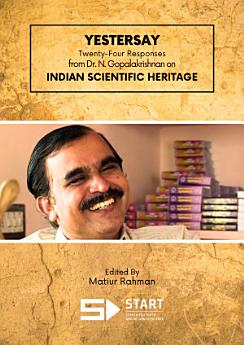Yestersay: Twenty-Four Responses from Dr. N. Gopalakrishnan on Indian Scientific Heritage
About this ebook
Through 24 question-and-answer chapters, the book sheds light on Indian contributions, including concepts like the pythagoras theorem, angular velocity, gravity and declination of the Earth, cyclic quadrilateral, grafting in plants, blood circulation, atom, drugs from plants, music pillar, beta brass, rhinoplasty, instrumentation, metallurgy, number knowledge, vimanas and the scientific spirituality and spiritualised science. It also addresses how ancient knowledge is relevant today in fields like aerospace engineering, materials science, and medical sciences.
The content emphasises the need for a balanced perspective—acknowledging India's significant scientific advancements without overstating claims—and encourages revisiting this heritage with a modern investigative approach.
Ratings and reviews
About the author
Matiur Rahman is a science filmmaker, author and a doctoral candidate in the Ph.D. in Science and Technology Communication programme of AcSIR (Academy of Scientific and Innovative Research) conducted at National Institute of Science Communication and Policy Research (NIScPR), New Delhi, India. His research explores the role of broadcast TV in science communication. He is also the Founder and President of START (Search for Truth and Return to Science), a registered society for promotion of scientific temper through the art, craft and technology of modern media. He lives in Delhi with wife Sabiha, sons Osama, Zaid (The Netherlands) and daughter in law Mizna.
A practitioner of reaching out with messages of science, Tausif Ahmed Sayed is a Chemical Engineer. His interests range from poetry to tracking technological advancements that have a bearing on societal benefit.
Search for Truth and Return To Science (START) is a registered voluntary, non-governmental, non-political, and non-profit making organisation at the national level in the field of promotion of technological innovation, scientific temper, and science communication through the art, craft, and technology of modern media.





